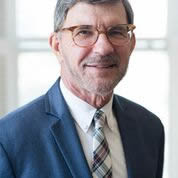Find a CBT Therapist
Search through our directory of local clinicians.
Terrence Patterson

Featured Therapist Interview
Terence Patterson, Ed.D., ABPP, is Professor and Director of the Psy.D. program in clinical psychology at the University of San Francisco. He is a licensed psychologist and is Board certified in Family Psychology with the American Board of Professional Psychology and an APA Fellow. He also chairs the USF Institutional Review Board for the Protection of Human Subjects (Research). In addition to family psychology, he specializes in ethical issues, couple therapy, behavioral health, and theoretical orientation in psychotherapy, and has taught most recently in these areas in the Marriage and Family Therapy Program. His independent practice focuses on behavioral interventions with individuals, couples, and families, with a specialization in treating difficult couples.
Dr. Patterson also lectures and consults with local mental health agencies and presents on ethics and family psychology at international conferences. He is on the boards of professional journals, and has published two books and numerous articles in his specialty areas, and is currently working on a book on Couple Therapy. Dr. Patterson was President of the Division of Family Psychology of the American Psychological Association in 2001, and President of the Association for Family Therapy of Northern California in 2007-08. He has been an appointed member of the Mental Health Board of San Francisco and the California Psychological Association Ethics Committee.
We would like to know a little about your practice.
What are your personal strengths as a practitioner?
My approach is tailored toward the needs of the client. I do a careful assessment, taking into account their priorities, related circumstances, and developmental trajectory. We develop a collaborative treatment plan together that accommodates their schedule, finances, and situation.
What “tips” can you offer to colleagues just opening a practice?
Specialize, learn a second or third language, and focus on a niche that is needed in your area. Also obtain as much continuing specialty training as possible to deepen your major area of practice. It’s good to practice together with allied professionals either in a group practice or through a peer consultation group. Be sure to join a professional association (national and local) and network!
How do you remind your patients of their strengths during the therapy process?
By reinforcing the strengths they bring in and their successes each time they follow up after a session and are successful in accomplishing their goals.
Are you involved in other types of professional activities in addition to your private practice?
Yes, I am a professor at the University of San Francisco and consult regularly on ethics and professional issues and couple therapy. I also publish regularly, mentor students, review for professional journals, and am a member of APA-related boards and committees. I have been president of the APA Society for Couple & Family Psychology, its ABPP board, and a member of the California Psychological Association Ethics Committee.
We would also like to know a little about you personally.
Who was your mentor?
Dr. Florence Kaslow in Couple & Family Psychology, Drs. Joseph White & Price Cobbs on diversity and inclusion, and Dr. Steven Zlutnick on Behavior Therapy.
When not practicing CBT, what do you do for fun?
I tour cities and travel with friends, bike, hike, go to good plays, movies, and concerts, cook, take photos, and find humor and beauty everywhere I go.
We are also interested in some of your views of CBT.
What do you think is the single most important thing CBT can do for your clients?
Provide structure, focus, efficiency, and effective treatment.
Where do you see the field of the behavioral therapies going over the next 3-5 years?
I see it gaining broader acceptance constantly, both in the ways clinicians learn effective treatments for specific disorders and common problems and the way it is portrayed in the media. In analyzing methods used in nearly all effective therapies, there is most often a behavioral component.
How do you use the local or social media to educate your community on the benefits of CBT?
I have been interviewed by local radio, TV, newspapers, and magazines about current events and the behavioral methods I employ.
Finally, we would like to know your opinions about ABCT.
How long have you been a member of ABCT?
30 years
How has ABCT helped you professionally?
I believe its annual convention is the best organized and useful, the referral directory is highly effective, and the resources on the web are accessible and practical.
What services do you consider the most valuable from ABCT?
See above.
What service(s) are missing from ABCT in your role as a practitioner?
Perhaps webinars (both synchronous and recorded) on topics related to current issues, especially those that are part of a sequence leading to a specialty; e.g. behavioral couple therapy, exposure therapy, etc. I would be happy to assist with these.
Thank you for taking the time to answer our questions!
